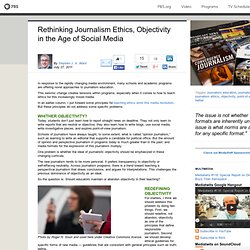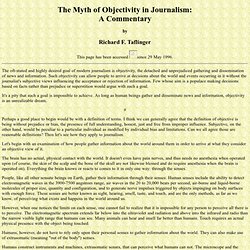

FOX News, MSNBC and Objectivity - Objectivity in Cable News. This is a confusing time for journalism students.

Professors stress the importance of objectivity in reporting, but some of the most prominent journalists in the country - the hosts of cable TV talk shows - are anything but objective. So what's going on? What's going on is that two of the three main cable news channels - FOX News and MSNBC - have discovered that opinion-based talk shows get high ratings. High ratings mean more money for these networks, so there's little incentive for either FOX or MSNBC to change their formats any time soon. FOX, on the one hand, is the conservative alternative for people who believe the so-called mainstream media have a liberal bent. MSNBC, meanwhile, has in recent years positioned itself as the liberal alternative to FOX. There's a reason O'Reilly, Olbermann and their ilk are popular - they're entertaining.
What is Objective Reporting? Objective reporting is a bit like science. An Example Again, the shows can be very entertaining. Principles of Journalism. The first three years of the Project’s work involved listening and talking with journalists and others around the country about what defines the work.

What emerged out of those conversations are the following nine core principles of journalism: 1. Journalism’s first obligation is to the truth Democracy depends on citizens having reliable, accurate facts put in a meaningful context. Journalism does not pursue truth in an absolute or philosophical sense, but it can–and must–pursue it in a practical sense. Objectivity in Journalism. DAVID BROOKS There is some dispute about whether objectivity can really exist.

How do we know the truth? Well, I’m not a relativist on the subject. I think there is truth out there and that objectivity is like virtue; it's the thing you always fall short of, but the thing you always strive toward. And by the way, I think that opinion journalists have to be objective just as much as straight reporters. Opinion journalists, too, have to be able to see reality wholly and truly. What are the stages of getting to objectivity? The second stage is modesty. The same thing has to happen for journalists. The third stage of objectivity is the ability to process data — to take all the facts that you've accumulated and honestly process them into a pattern.
The fourth stage of objectivity is the ability to betray friends. The fifth stage of objectivity is the ability to ignore stereotypes. And the last bit, the sixth stage is a willingness to be a little dull. David Brooks. Copyright © 2006 Imprimis. Rethinking Journalism Ethics, Objectivity in the Age of Social Media. In response to the rapidly changing media environment, many schools and academic programs are offering novel approaches to journalism education.

This seismic change creates tensions within programs, especially when it comes to how to teach ethics for this increasingly mixed media. In an earlier column, I put forward some principles for teaching ethics amid this media revolution. But these principles do not address some specific problems. Whither objectivity? Today, students don’t just learn how to report straight news on deadline.
Public Journalism and the Problem of Objectivity. Objective journalism - dead or drowned out? Alex Jones: Objectivity in Journalism. The Myth of Objectivity in Journalism. By This page has been accessed since 29 May 1996.

The oft-stated and highly desired goal of modern journalism is objectivity, the detached and unprejudiced gathering and dissemination of news and information. Such objectivity can allow people to arrive at decisions about the world and events occurring in it without the journalist's subjective views influencing the acceptance or rejection of information. Few whose aim is a populace making decisions based on facts rather than prejudice or superstition would argue with such a goal.
It's a pity that such a goal is impossible to achieve. Perhaps a good place to begin would be with a definition of terms. Let's begin with an examination of how people gather information about the world around them in order to arrive at what they consider an objective view of it. The brain has no actual, physical contact with the world. People, like all other sensate beings on Earth, gather their information through their senses.
The Myth of Objective Journalism.